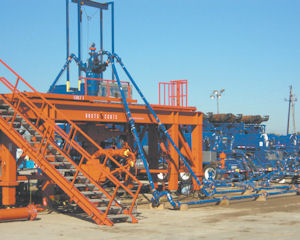The mad search for shale gas has BNK Petroleum Inc. and others looking to strike it rich in Poland. But this small Camarillo company may find there is more value in the land it’s purchased at cheap prices than the gas that’s buried deep under the Polish soil. BNK, which reported $18,000 in profit on $20.2 million in revenue for the nine months ended Sept. 30, is a spinoff of Calgary, Alberta-based Bankers Petroleum Ltd., which spun off its U.S. holdings three years ago. Since then, the company has focused its efforts on shale exploration in Europe, buying drilling rights on some 4.4 million acres of land in Germany, Spain and Poland. Poland is said to have Europe’s largest reserves of shale gas, as much as 180 trillion cubic feet, according to the U.S. Geological Survey. And BNK was an early mover, buying up drilling rights at what BNK CEO Wolf E. Regener said were “pennies on the dollar.” In the U.S., where the shale gas industry is much further along, the right to drill on land can cost up to $25,000 an acre, he said. That early mover advantage may yet help BNK, even though the company has had its share of disappointments in recent months. Two wells have proven to be washouts and testing on a third was not effective, Regener said. But the company is just getting started. “We will continue to retest this well and drill two additional wells where we think we have a good chance of the shale looking better than the other sites,” he said. Though drilling is an expensive proposition — testing a single well can cost as much as $7 million — BNK only has to be as lucky as some of the other competing companies drilling in the region. If just one finds commercially viable shale gas, the value of BNK’s drilling rights will likely soar, making it a hot acquisition target for Exxon Mobil Corp., ConocoPhillips or any of the 20 or so much more highly-capitalized companies exploring the region. “It’s possible that a few years from now, as the cost of entry grows, they become a good acquisition candidate,” said George Toriola, executive director of UBS Securities in Calgary, who follows BNK on the Toronto stock exchange. But that’s still a big if. Exxon has run into some challenges in recent months, and has acknowledged that commercially-viable shale may be as much as five years away. Two tests yielded disappointing early results. The company found gas, but the gas “failed to flow at commercial volumes,” according to the industry publication International Oil Daily. “We’ll be analyzing (those results), evaluating the various characteristics of the shale there and working on our go-forward plans,” Exxon Mobil officials told analysts on the company’s fourth-quarter earnings conference call. Companies from ConocoPhillips to 3LegsResources have reported similar results. But companies say it’s too too early to discount the potential of Poland. For one, even if tapping shale proves more expensive than in the U.S., companies can still profit. Regener said the price of shale is significantly higher in Europe than in the U.S. Chevron also has said it’s too early to draw conclusions. It recently told the industry publication Platts Commodity News that any call on the value of shale in Poland is at least two years away. Chevron has begun vertical drilling, but has yet to begin the horizontal process that is part of hydraulic fracturing, or fracking, in which water and chemicals are injected at high pressure into rock to release the trapped gas. That process is highly contested in the U.S. Some parts of Europe — France, for example — are experiencing similar environmental resistance. But Poland, which depends on Russia for almost all its energy needs, is eager to exploit this natural resource to achieve energy independence. “Poland is very supportive of shale gas,” Regener said. Regener also emphasized that it’s too early to give up. It takes 12 to 25 wells to discover the best spot in a vast basin such as Poland’s and so far, companies have only drilled eight wells, he said. Back in Camarillo, Regener’s team is making plans to retest the one well that proved disappointing and then go onto two other sites that Regener believes will be better. Not only is the rock more promising — similar in nature to the rock that proved profitable on BNK’s Oklahoma property — but BNK owns those sites outright, meaning it would not have to share the proceeds. “They look more promising,” Regener said. He said the company will begin drilling one site in April and another in May. With $42 million in cash, Regener said BNK has enough money for now to keep drilling and testing. Ultimately, he hopes that BNK’s drilling rights will pay off. BNK’s valuation is now pegged to what its 27,000 acres of shale-producing land in Oklahoma is worth. In Europe, he said, the company owns far more land. If that land begins to approach valuations anywhere near what the U.S. land is worth, BNK will win big. “It’s a huge potential asset value,” Regener said. But, as Toriola notes, if none of the big companies drilling in the region find commercially viable gas, BNK will have lost the gamble and will have to move on to its properties in Spain and Germany, and start pouring money into test wells there. “There’s a significant amount of risk,” he said.
